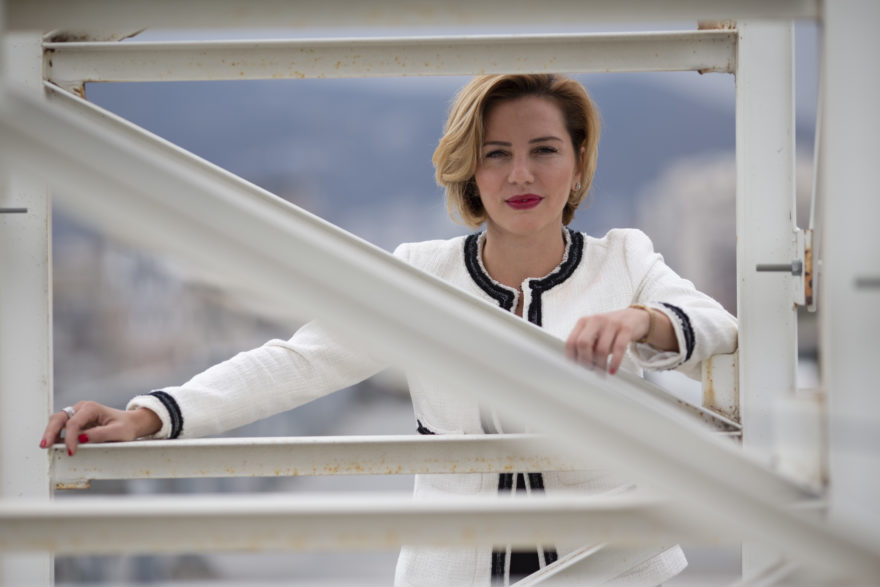Anna Dolidze
This article is a part of the campaign #12 Women on the Barricades, developed by The Norwegian Helsinki Committee in collaboration with illustrator Jenny Jordahl. We present 12 portraits of women standing on the barricades for other women, focusing on the greatest human rights challenges facing women in Europe today – and what needs to be done to overcome them. Read about the 11 other women on www.nhc.no/en/12womenonthebarricades
“Today we have façade justice, façade law enforcement bodies, façade democracy, and a façade government”, says Anna Dolidze and challenges Georgia’s behind-the-scenes ruler, billionaire Bidzina Ivanishvili.
In 2004, at the age of 23, she was head of “Georgian Young Lawyers’ Association” (GYLA), a leading human rights group in the Caucasus. They supported the Rose Revolution that brought the young and charismatic Mikheil Saakashvili to power.
Soon, she became one of his staunchest critics.
Dolidze is not yet forty, but she has witnessed Georgia go through political upheavals and several armed conflicts. She has worked for almost 20 years to keep Georgia on the path towards democracy, developing tolerance and respect for human rights.
Today she is an independent member of the High Council of Justice, the body tasked with appointing judges to the courts of Georgia. She is also an internationally recognized human rights lawyer.
The Soviet legacy
Even if Georgia has taken long steps away from its authoritarian heritage, the growing pains are not over. The country seems to follow a peculiar rhythm. Democratic gains are followed by backlashes, perhaps as a result of having deferred dealing with the 70 year–long Soviet dictatorship.
In spring 2019, there were huge demonstrations in Tbilisi against perceived Russian influence in the country. The government responded with batons and rubber bullets.
Last summer, the main opposition TV-channel was taken over by a new owner with connections to the government, and the politician responsible for the brutal crackdown in May returned to the government as prime minister.
Part of this picture is the attack on the independence of the judiciary, which Dolidze criticized. The government wants to limit the space for criticism, in order to ensure no unpleasant surprises in the parliamentary election in 2020.
Land of fairytales
Old castles, beautiful churches and remnants of pre-Hellenic civilizations crown the hills. The capital Tbilisi is a fascinating mix of old and new. In the beginning of last century, Knut Hamsun called it the land of fairy tales. But Georgia is situated in a volatile neighbourhood.
After independence in 1991, the economy collapsed, and civil war broke out. The old communist leader Eduard Shevardnadze returned in the middle of the nineties and ended the armed conflicts. His government was marred by corruption and fell in the Rose Revolution.
Just as with his predecessor, Dolidze became one of Saakashvili’s staunchest critics. She was leading an investigation of a murder the government allegedly had a hand in. Her involvement resulted in her being exiled in Canada, Europe and the United States.
“I want to return to Georgia, she said, but I also want to live in a place where I do not have to worry about what could happen tomorrow and if my family will return when they leave the house”.

In 2008, war broke out between Georgia and Russia. Four years later, Saakashvili was forced out of power after his party lost the parliamentary election to the opposition coalition called “Georgian Dream”. In 2015, Dolidze entered government as deputy minister of defense. The following year she became the president’s representative in the parliament.
2020 – A decisive year
Both inside and outside the governmentalinstitutions, Dolidze has remained an uncompromising defender of human rights. She could neither be threatened or paid off to be silent. For this reason, she ended up in conflict with “Georgian Dream”, which many see as a vehicle controlled by Georgia’s richest man, Bidzina Ivanishvili.
She is now out of politics but remains a well-known and respected voice in Georgia.
Historically, it seems like Georgia makes a democratic leap forward every eighth or ninth year, before the pendulum goes back again. If this scenario is repeated, 2020 may see another shift of power after the elections.
While opinion polls suggest that “Georgian Dream” is losing support, the government is tightening the reins. Probably they remember how a broad coalition of civil society groups and independent media, supported by the international community, were able to protect the electoral process that dethroned Saakashvili in 2012.
The signs are ominous, but hopefully will this year’s election be held according to democratic standards. If Georgia is to avoid stumbling into authoritarianism again, one thing is certain: Anna Dolidze will play a central role.
